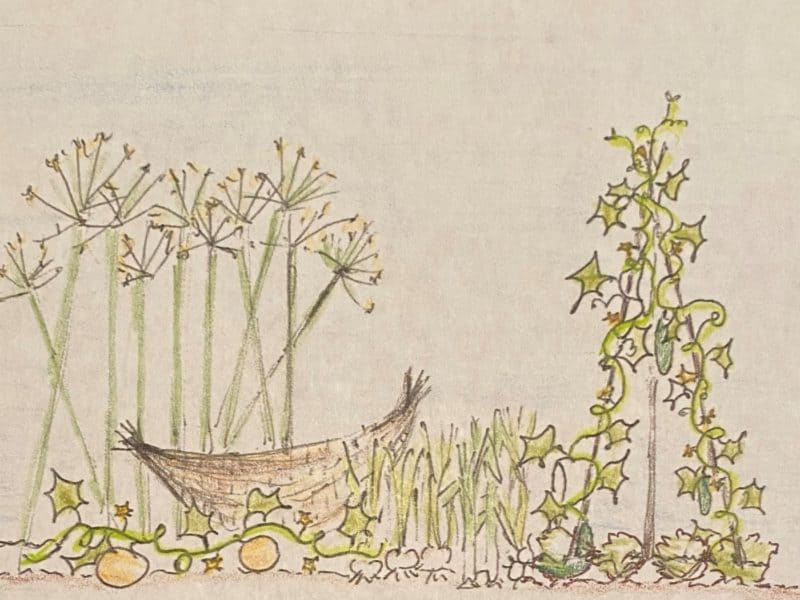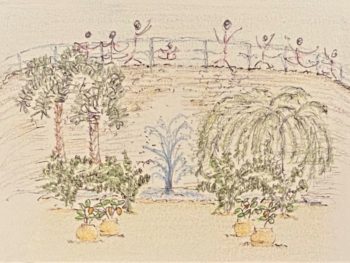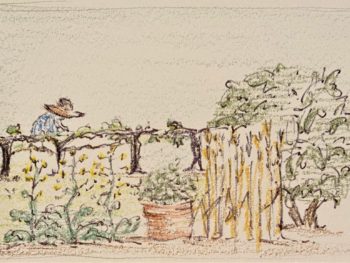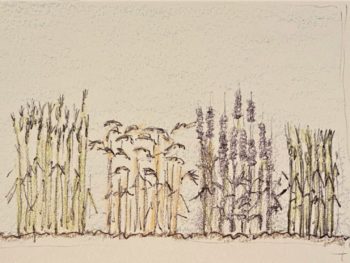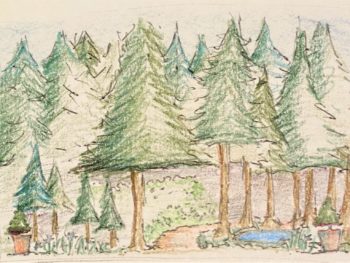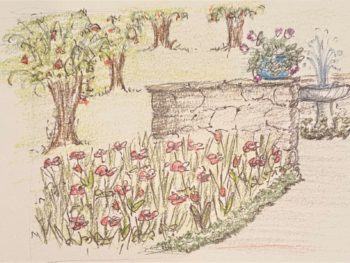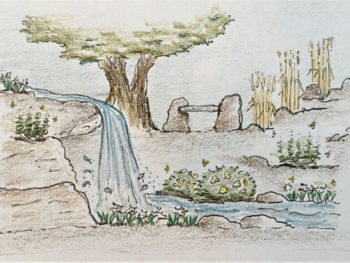Welcome to the Prophets & Leaders Bible Garden Design Lent Series, a sequence of landscape vignettes incorporating the plants and scenery features surrounding faithful prophets and leaders of the Bible. This seven-week series will reveal for us the Scripture story through the senses, that we may enter into the spatial depth of God’s Word, absorbing the scents and sights of God’s garden beauty.
After all…these Words are our life, declared Moses (Deuteronomy 32:47). Any gardener awakening to the landscape dimension of the Bible won’t be able to simply let the Words lie flat on a page! We will come alive and be moved to plant and taste and see and tinker with—putter, relate, dig in, and create. May God’s inspiration refresh you this Lenten season as you imagine the Word in the land.
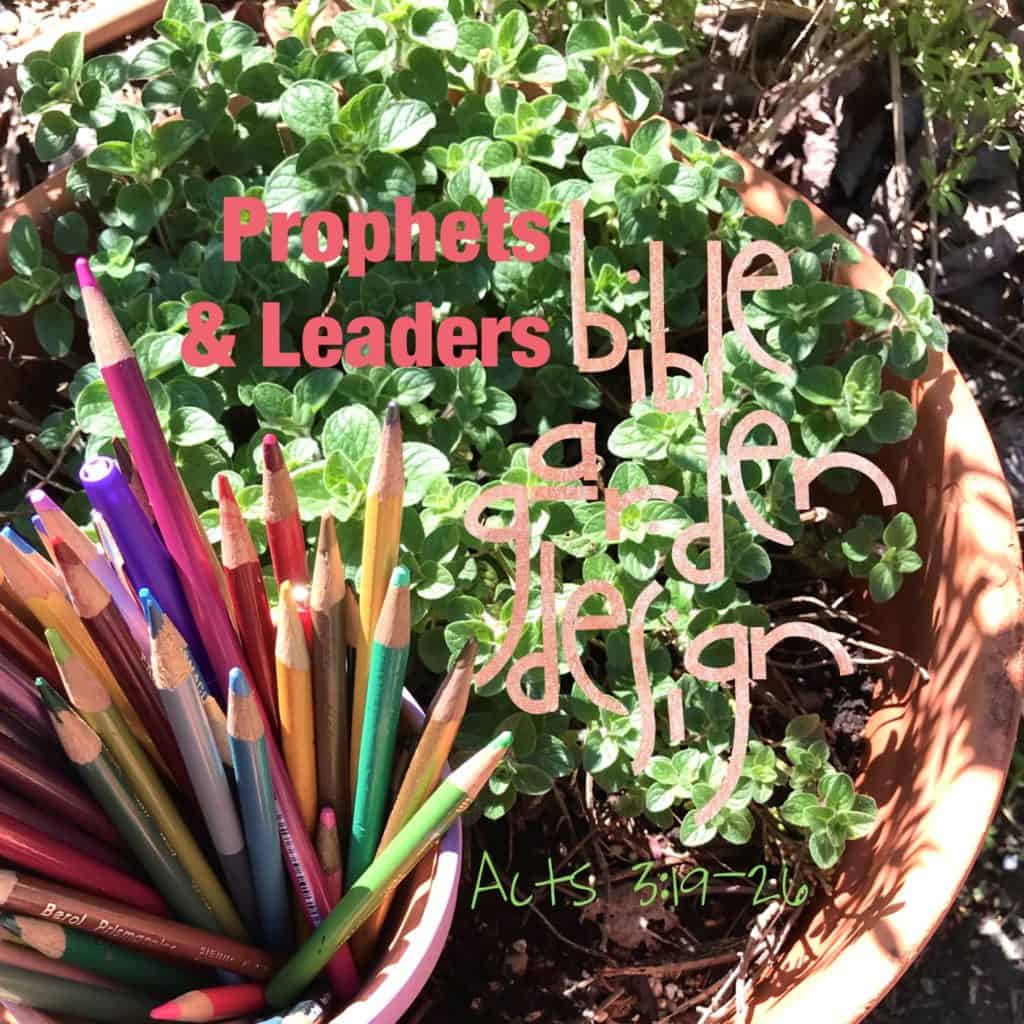
Each week’s blog will offer a breezy glance and a deeper gaze; take in whichever fits your timing:
Schematic Design will highlight key elements, complimented with a Deeper Dig into the background story if you have time for more reading.
Plant Palate will recommend plants to feature, with a Scripture Guide at the end if you would like to see the plants as they are written in verse.
Landscape Views will offer glimpses of gardens I’ve visited with design ideas in practice.
Words for Lent will offer further insight for the Lenten season into the relationship of the featured prophet or leader with repentance, his Reflections of the Messiah appointed for you, and the Time of Restoration spoken of by the holy prophets, according to Acts 3:19-26.
Moses’ Murmuring Vegetables
Why begin with a vegetable garden? We are looking at epic design, O Lord, and the vegetable patch is usually at the back of a landscape, a working, weedy garden tucked away out of sight. Hmmm.
Yes, we will be moving towards gracious flower fields and greetings of evergreens in the landscapes to come…but as most of us give up goodies for Lent, aren’t we left with a slim diet of vegetables!? LOL, this is the Lord’s subtle humor at work, teasing us over our self-imposed, sacrificial Lenten diets as a place to start.
However, more and more public gardens are giving edible plants a place of prominence on their grounds. Both the Dallas Arboretum’s A Tasteful Place and San Antonio Botanical Garden’s Zachry Foundation Culinary Garden feature vegetable-growing upfront by the entrance.
Lettuce carry on, then!
Schematic Design
One of Moses’ critical leadership moments is highlighted by one of the Bible’s classic plants lists: Leeks, onions, garlic, cucumbers, and melons. Let the cries of this verse create the heart of this cultivated space, anchoring its designation as a vegetable garden. Beds for these Numbers 11:5 well-watered, annual vegetables and vines can be featured along with more enduring, even perennial in warmer climates, hyssop and bitter-leaved chicory, endive, or dandelion from Exodus 12:8. Grains could also come alongside from the hail report of Exodus 9:31.
Moses’ life moves from Egypt to the Sinai Desert; a landscape reflecting his leadership can also showcase these two extremes: the flooding water’s edge of his Nile River birth to a dry, drought-enduring landscape where he led the Israelites’ departure.
Add the whimsy of an interpretive burning bush, coriander-colored “manna,” bookended by the warning of wormwood to round out the scenery-story.
Terrain: While rugged, craggy mountains were backdrop to the Israelites’ desert escape, and Moses received the Ten Commandments atop the fire-encircled Mount Sinai, the landscape should be sighted on level ground, perhaps capitalizing on a poor drainage area by incorporating it into the Nile’s watery imagery. This is absolutely a sunny landscape.
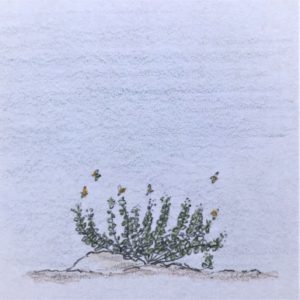
Plant Palate
links provided will take you to cultural information in the Plant Guide
- Vegetables: leeks, onions, garlic, chicory, endive, dandelion, lettuces
- Vines: cucumbers, melons
- Herbs: hyssop, coriander
- Grains: barley, wheat, spelt, flax
- Desert Plants: wormwood
- Water Plants: papyrus, reeds, water lilies
- Mystical Plants: burning bush, manna
Landscape Views
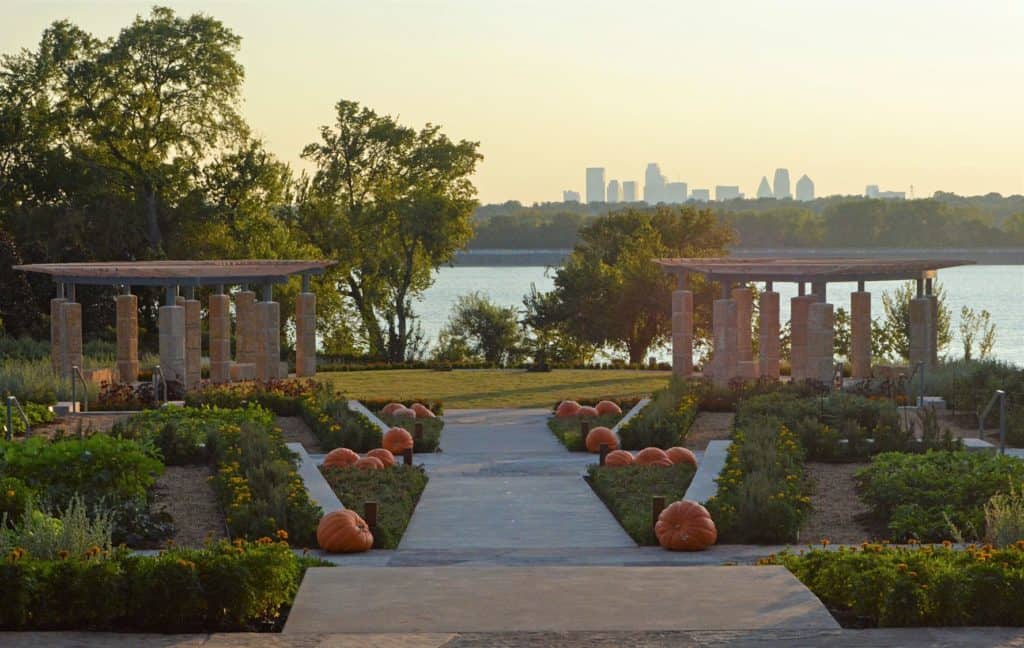
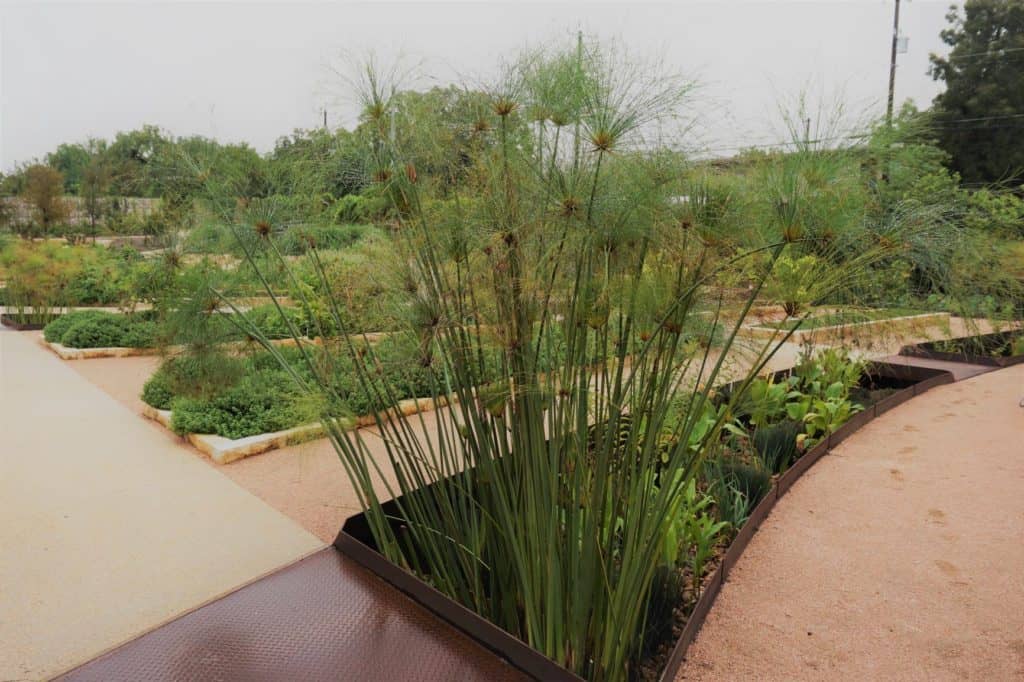
Deeper Dig into Moses’ Leadership
Moses was the great prophet-leader who drew his people out of slavery in Egypt to a flourishing life in the land promised to them by God. His name in Hebrew means “He draws out.” In savory Biblical story detail, his adopted mother likewise drew him out—out of the water of the Nile River, where his birth mother had placed him in a papyrus basket among the reeds on the shore, and out of the death sentence placed upon Hebrew sons at the time he was born.
When the time had come for the Lord to act on behalf of his people in Egypt’s bondage, God called Moses from a burning bush. The identity of this species set ablaze continues to be debated. A bramble still grows on the alleged site in Sinai, while modern plant breeders have ascribed allusions of this name to shrubs fiery in color, Euonymus alatus the most well-known.
The LORD soon sent a series of plagues on the Egyptians, culminating in the Israelites’ preparing a hasty last meal of bitter herbs, lamb and hyssop before their dramatic escape to the desert from the final plague of death, celebrated ever since as the Passover dinner.
While we might expect the opposite, as the people moved under Moses’ leadership from slavery to freedom, they left the lush, abundant vegetation and orderly vegetable-growing of Egypt for a wandering existence in the scorching landscape of the Sinai Desert. Their slavery was paired with savory comfort food, while their liberating journey was matched with “what is it?” or monotonous manna to eat. In the midst of this, naturally the Israelites murmur and wail for the vegetables they miss. Plot twist again: many of today’s children also complain when those very vegetables are abundant on their plates!
Near the end of Moses’ term, on the edge of entering the promised land beckoning Israel’s new life, Moses issues final warnings to choose to stay fresh and current in the Lord, and not turn from Him to other gods, backed by a botanical emphasis of poison hemlock* and wormwood, two bitter-tasting, toxic plants. His warning might read: Don’t go from bitter to bitter! You were saved from bitter-herbed slave-labor, and you will go right back to a bitter-wormwood life if you turn from the Lord who delivered.
Read the full tale of Moses’ Life in the books of Exodus, Leviticus, Numbers, and Deuteronomy
Scripture Guide
a quick reference of verses mentioning plant material:
Now a man from the family of Levi married a Levite woman. The woman became pregnant and gave birth to a son; when she saw that he was beautiful, she hid him for three months. But when she could no longer hide him, she got a papyrus basket for him and coated it with asphalt and pitch. She placed the child in it and set it among the reeds by the bank of the Nile.
Exodus 2:1-3 HCSB
There the angel of the Lord appeared to him in a flame of fire out of a bush; he looked, and the bush was blazing, yet it was not consumed. Then Moses said, “I must turn aside and look at this great sight, and see why the bush is not burned up.” When the Lord saw that he had turned aside to see, God called to him out of the bush, “Moses, Moses!” And he said, “Here I am.”
Exodus 3:2-4 NRSV
The flax and the barley were destroyed, because the barley was ripe and the flax was in bloom. But the wheat and the spelt were not destroyed, because they ripen later.
Exodus 9:31-32 EHV
…they shall eat [the lamb] roasted over the fire with unleavened bread and bitter herbs.
Exodus 12:8 NIV
We remember the fish we used to eat in Egypt — it cost us nothing! — and the cucumbers, the melons, the leeks, the onions, the garlic!
Numbers 11:5 CJB
The manna was like coriander seed and looked like resin. The people went around gathering it, and then ground it in a hand mill or crushed it in a mortar.
Numbers 11:7-8 NIV
In Egypt you planted your seeds and used your feet to pump water from the canals to water your fields like a vegetable garden.
Deuteronomy 11:10 ERV
… Lest there should be among you man, or woman, or family, or tribe, whose heart turneth away this day from the Lord our God, to go and serve the gods of these nations; lest there should be among you a root that beareth gall [poison hemlock]* and wormwood.
Deuteronomy 29:18 KJV
Words for Lent
Lent is not a command of the Bible. Instead, it is an age-old practice of the faith, a way to reflect the life of Christ in our lives, a choice to draw closer to Him by following what He did. It transplants Jesus’ time of retreat to the wilderness (Matthew 4:1-11, Mark 1:12-13, Luke 4:1-13) into our lives by giving up a favorite treat – the 6 a.m. coffee, the 3 p.m. chocolate, the 5 p.m. glass of wine – patterning His testing in our own, in hopes to meet Him at that time instead. We adopt this practice for 40 days, imitating His 40 days, inaugurated by Ash Wednesday (yesterday).
We pray to emerge from this observance of restraint with a deeper awe of the Lord, a trusting reliance, and a transformation and renewal. May we then be ready to more wholeheartedly delight in the freedom He won for us in his death and resurrection, celebrated at the end of this repentant period.
Repent is the call of Lent.
The following Scripture of repentance will be our guide through this series:
Repent therefore,
and turn to God
so that your sins may be wiped out,
so that times of refreshing may come from the presence of the Lord,
and that he may send the Messiah appointed for you,
that is, Jesus,
who must remain in heaven until the time of universal restoration
that God announced long ago through his holy prophets.
Acts 3:19-21 NRSV
Moses’ Reflections of the Messiah:
Moses discussed very practical procedure with the Israelites, that in their life and livelihoods, God would see to it that a prophet would be available for spiritual words and direction. However, Peter revealed that Moses’ explanation actually echoed ultimate plans as well, pointing to the Messiah, Jesus, who seemed to respond Moses: Accomplished.
The Lord your God will raise up for you a prophet like me from among you, from your fellow Israelites. You must listen to him.
Deuteronomy 18:15 NIV
I will raise up for them a prophet like you from among their fellow Israelites, and I will put my words in his mouth. He will tell them everything I command him.
Deuteronomy 18:18 NIV
Response:
After Jesus said this, he looked toward heaven and prayed… I gave them the words you gave me and they accepted them. They knew with certainty that I came from you, and they believed that you sent me.
John 17:1, 7-8 NIV
Moses’ Reflections on the Time of Restoration:
Moses does not give specifics as we will see with other prophets on the time of ultimate restoration (Acts 3:21), but his recount of the Lord’s proclamation is repeated throughout the generations of Israel, and we can understand God’s gracious forgiveness as having an ultimate nature.
Then the Lord came down in the cloud and stood there with him and proclaimed his name, the Lord. And he passed in front of Moses, proclaiming, “The Lord, the Lord, the compassionate and gracious God, slow to anger, abounding in love and faithfulness, maintaining love to thousands, and forgiving wickedness, rebellion and sin.
Exodus 34:5-7 NIV
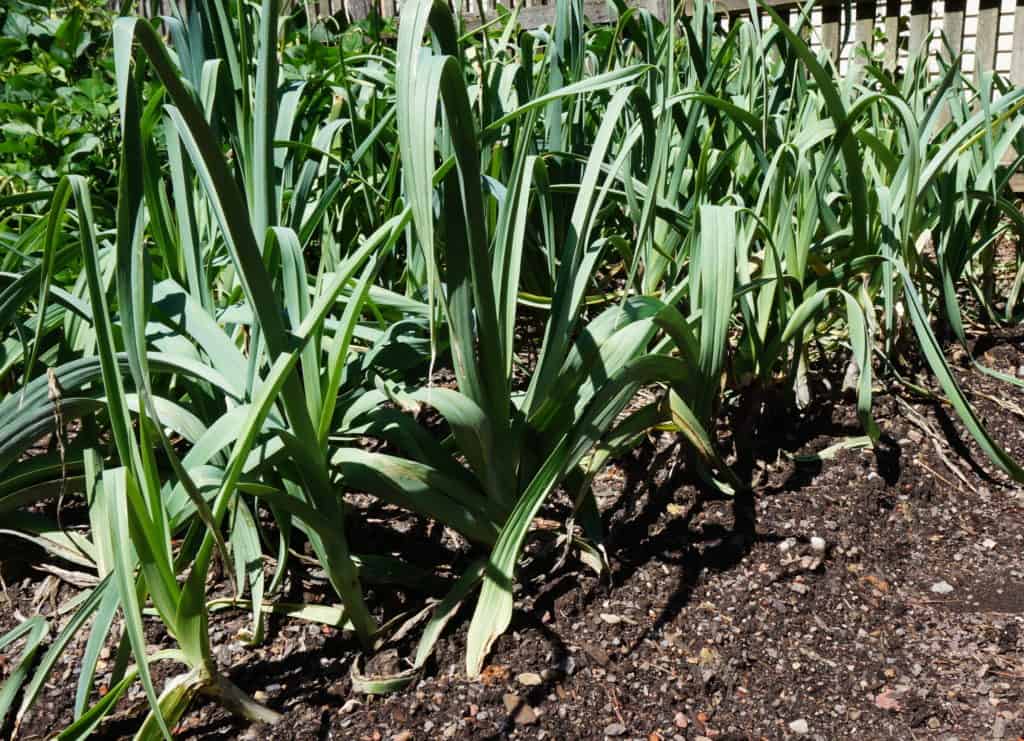
Further Study:
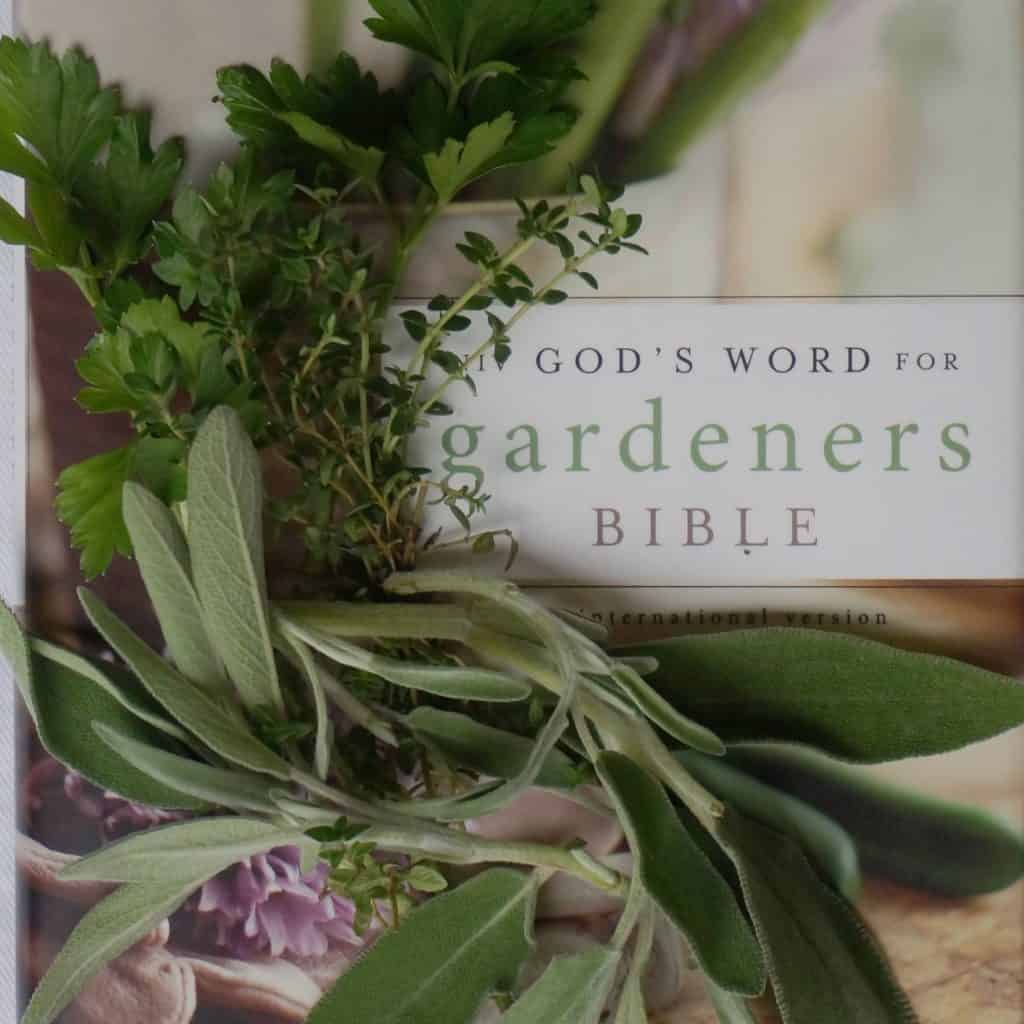
Dig into more devotions in the Garden Tour section of God’s Word for Gardeners Bible on Egypt and Sinai Desert, beginning on page a-14
Find related content in devotions on Cultivating, featuring leeks, onions, garlic, and cucumbers, beginning on page a-26
See the Plant Index for a complete list of all the mentions of plants in God’s Word for Gardeners Bible, www.gardenindelight.com/plant-index-gods-word-for-gardeners/
*Many thanks to Dr. Musselman for his teaching on gall and poison hemlock from Deuteronomy 29:18, in Figs, Dates, Laurel and Myrrh (Portland, Ore.: Timber Press, 2007), page 140-143 . Of course, I am not proposing that poison hemlock is a wise plant choice for gardens, but a plant-cousin in the Apiaceae family might be an thought-provoking substitute.
Find a Biblical plant bibliography in Plant Resources, www.gardenindelight.com/plant-resources/
Photo Credits & sketches
©2018-20 Shelley S. Cramm (except A Tasteful Place image as noted)

